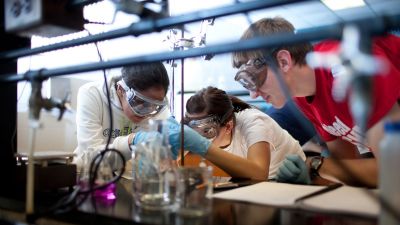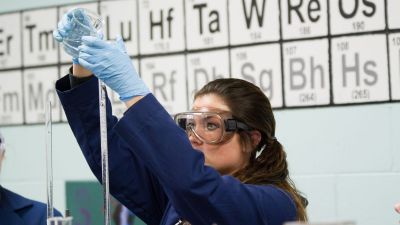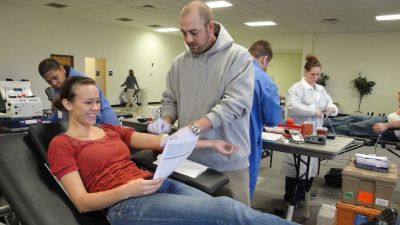
B.A. B.S. Biology
Biology is the study of life in all its unique forms, from microorganisms to macroorganisms and the environments that they inhabit. Biology majors at Concordia University, Nebraska learn many valuable skills that directly translate to the working world, such as running experiments, analyzing results and formulating hypotheses. With a major in biology, you have multiple career opportunities: from careers in biology (such as working in biology labs) and careers where biology is a crucial foundation (such as working in health industries).
The biology program at Concordia is a home for students who want to pursue their chosen vocation not for the sake of wealth, but for the sake of the Kingdom of God and the people He has placed here for us to serve. Classes and labs are taught by faculty with the highest degrees in the biological sciences who are committed to education and their students. Earn your bachelor’s degree in biology from Nebraska’s only nationally recognized Christian College of Distinction and find out how your faith can support and encourage your love of biology.
Learn more about God’s creation!
Program Highlights
WHY STUDY BIOLOGY AT CONCORDIA?
Concordia University, Nebraska is a home for students who want to pursue biology vocations in health, education, research or industry not for the sake of wealth, but for the sake of the Kingdom of God and the people He has placed here for us to serve.
Biology classes and labs at Concordia are taught and supervised by faculty with doctorates in the field of biological science who are fully committed to education and their students.
MEET OUR EXPERT FACULTY
As experts in biology, our faculty and instructors bring years of experience to the classroom.
Meet our students
“I think that science is a really cool template to help explore God’s creation, and I really want to help other people see that. ”
Julia Witt
Columbus, Nebraska
Accreditation
Concordia University, Nebraska is accredited by the Higher Learning Commission, a regional accreditation agency recognized by the U.S. Department of Education.
Micah Scholars Pre-Health Scholars Program
Micah Pre-Health Scholars is designed to help students be successful in their healthcare vocations through hands-on experiences, community support and graduate or professional school preparation.
Degree Goals
A biology program graduate from Concordia University, Nebraska will be able to:
- Exhibit basic mastery of the principles of biology.
- Reason analytically and apply that analysis to biology concepts.
- Demonstrate basic scientific skills, including using various scientific instruments to make measurements in the lab and field.
- Employ appropriate experimental design and methodology, effectively communicating underlying principles of biology.
Natural Sciences Minors
- Agricultural Science
- Biology
- Chemistry
- Environmental Studies
- Physics
Career Outcomes
Biochemist
- Understand how drugs, hormones and foods can impact living organisms
- Work in a lab, collecting data and conducting research
Medical Doctor
- Treat patients for illnesses and injuries
- Prescribe medications and diagnose ailments
Microbiologist
- Study organisms that are too small to see without a microscope, such as bacteria, viruses, fungi and certain parasites
- Collect data and perform research to understand how those organisms live, grow and interact with their environments
FAQs
Why is the study of biology important?
Biology is important to our everyday routines. The study of biology is the cornerstone of modern healthcare, from immunology, which studies the human immune system, to pathology and virology, which diagnose diseases, to pharmacology, the creation of pharmaceutical drugs.
Biological science is also instrumental in understanding our environment, helping us make the most of our planet’s natural resources and minimizing our impact. Everything from conservationism to food science to the study of fossil fuels and renewable resources depends on the research of biologists.
Biology is the study of God’s creation—all life and living organisms and how they interact with each other and their environment. Biology helps feed us, keeps us healthy and teaches us about the world around us.
What kind of careers can you get with a degree in biology?
A degree in biology can open the door to a wide range of careers in various fields. Some common career paths (some of which require additional specialized training) include:
Healthcare professions such as doctor, pharmacist, veterinarian, clinical lab technician or medical researcher.
Research and development opportunities such as research scientist, lab manager or biotechnologist in fields like pharmaceuticals, genetics, biotechnology and more.
Environmental conservation in areas like wildlife biologist, environmental consultant, conservation science or marine biologist.
Education teaching biology or natural science at the high school level or at a college or university.
Biotechnology as a biotech analyst, quality control technician or biotechnology engineer.
Public health careers such as epidemiologist or health educator.
Agriculture and food science in a position like agricultural scientist, food safety analyst or crop researcher.
A biology degree from Concordia University, Nebraska can provide you the strong foundation you need to enter fields that contribute to health, science or environmental sustainability.
What’s the difference between a Bachelor of Arts degree in biology and a Bachelor of Science degree in biology?
The Bachelor of Arts (B.A.) in biology degree from Concordia University, Nebraska includes coursework in liberal arts, such as the humanities, social sciences and foreign languages. You will earn a solid base in general biology and the basic principles of physical sciences with the flexibility to branch out into different areas of interest. Generally, students who earn their bachelor of arts degree in biology are those who are seeking to become teachers or find careers in health care administration.
The Bachelor of Science (B.S.) degree in biology is the degree recommended for students who are looking for a career in biological or biomedical sciences, in research, laboratory work or medical fields. The bachelor of science in biology program emphasizes biology and other physical science courses, as well as mathematics and physics classes.
What types of classes does a biology major take?
Beyond the basic introductory biology, physics, chemistry and mathematics classes, at Concordia University, Nebraska, you will have the opportunity to study a variety of different types of biological sciences, to give you the broad skill set you need to be successful in any biology career. Biology courses for both the bachelor of arts and bachelor of science degrees in biology may include anatomy, molecular biology, zoology and ecology classes, as well as forensic science, immunology and microbiology. You may also choose to take electives in the biology field that most interests you, from criminology to human diseases to exercise science to environmental biology.
Related Programs

Pre-Medical
At Concordia University, Nebraska, you will receive a liberal arts background in chemistry, biology and the physical sciences that you’ll need in order to succeed in medical school. As a pre-med student at Concordia, you’ll get hands-on lab experiences, cadaver dissection and mentoring from expert science faculty. You’ll also have the opportunity to intern and job-shadow with local physicians.

Pre-Medical Laboratory Science
Concordia University, Nebraska’s pre-clinical laboratory science program partners with many local hospitals, clinics and organizations that offer hands-on internships and volunteer experiences, so you can observe professional medical laboratory scientists as they process specimens, workflow, phlebotomy and other laboratory procedures. Concordia’s on-campus state-of-the-art science facilities will allow you the workspace you need to become proficient in laboratory procedures.

Pre-Nursing
Concordia University, Nebraska’s pre-nursing program will prepare you to excel in nursing through a mastery of natural and behavioral science skills, critical writing and analytical reasoning, and opportunities to grow through service, health care internships and research. You will gain foundational knowledge in the sciences, such as chemistry and biology, as well as the psychology and sociology courses you will need to continue your education in nursing.
1 Recent graduates attending graduate school or employed within six months of graduation.
2Average Class Size for Representative Subject Most Aligned with Major, Over Last 5 Years.